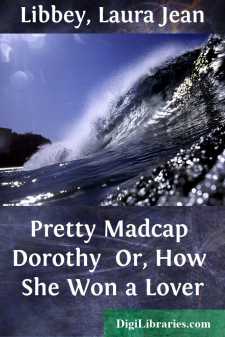Fiction
- Action & Adventure 180
- Biographical 15
- Christian 59
- Classics
- Coming of Age 5
- Contemporary Women 3
- Erotica 8
- Espionage/Intrigue 12
- Fairy Tales, Folklore & Mythology 236
- Family Life 169
- Fantasy 117
- Gay 1
- General 596
- Ghost 32
- Historical 808
- Horror 43
- Humorous 160
- Jewish 25
- Legal 4
- Medical 22
- Mystery & Detective 315
- Political 49
- Psychological 41
- Religious 64
- Romance 159
- Sagas 11
- Science Fiction 730
- Sea Stories 113
- Short Stories (single author) 537
- Sports 10
- Suspense 1
- Technological 8
- Thrillers 2
- Urban Life 31
- Visionary & Metaphysical 1
- War & Military 173
- Westerns 199
Classics Books
Sort by:
CHAPTER I. PLAYING TRUANT A breezy morning after a night of rain. Fleecy clouds, some in massive folds and fantastic shape, some in small half-transparent wisps like sunlit ghosts, were driven rapidly across the blue. Hurrying shadows flecked the swelling bosom of the downs, and where the grass was long it rippled like a green sea, making rustling music. Overhead the larks fluttering upward,...
more...
CHAPTER I. When the idea of a removal to Virginia was first mooted in the family of General Percival Smith, ex-Brigadier in the United States service, it was received with consternation and a perfect storm of disapproval. The young ladies, Norma and Blanche, rose as one woman—loud in denunciation, vehement in protest—fell upon the scheme, and verbally sought to annihilate it. The country! A farm!!...
more...
by:
Jules Claretie
Arsene Arnaud Claretie (commonly called Jules), was born on December 3, 1840, at Limoges, the picturesque and smiling capital of Limousin. He has been rightly called the "Roi de la Chronique" and the "Themistocle de la Litterature Contemporaine." In fact, he has written, since early youth, romances, drama, history, novels, tales, chronicles, dramatic criticism, literary criticism,...
more...
by:
J. V. McFall
CHAPTER I John Armitage, Lieutenant U. S. N., followed the porter into the rear car of the midnight express for Boston, and after seeing his bag deposited under a lower berth, stood for a minute in frowning indecision. A half-hour must elapse before the train started. He was not a bit sleepy; he had, in fact, dozed most of the way from Washington, and the idea of threshing about in the hot berth was...
more...
by:
Jules Michelet
When it was first proposed to publish an English Translation of this admirable work, its gifted Author wrote to the Translator to the following effect: "This work cannot be without interest to the people of England, among whom, at this moment, the Jesuits are so madly pursuing their work. Nothing is more strange than their chimerical hopes of speedily converting England." Indeed, their...
more...
CHAPTER I. Wherein is shown how sagely the Rev. Master Fröhlich brought up his motherless daughter, pretty Michal. In the days when the Turkish Sultan ruled in Hungary as far as Ersekujvar and Eger, the German Kaiser from Eger to the Zips country, and George Rakoczy, Prince of Transylvania, from Zips to the Szeklerland—all three of whom were perpetually fighting among themselves, sometimes two...
more...
Chapter I. "It's so hard for working-girls to get acquainted. They never meet a rich young man, and they don't want a poor one. It seems to me that a girl who has to commence early to work for her living might just as well give up forever all hopes of a lover and of marrying," declared Nadine Holt, one of the prettiest girls in the immense book-bindery, to the group of companions who...
more...
ALL YOU COULD WISH FOR Ease of operation and convenience in carrying, lens and shutter equipment, quality of results and price—these, together with unquestioned reliability, are the factors which logically should determine the selection of a camera in every case. Anyone who contemplates the purchase of a camera, and who will make his selection upon this basis will find in the Premo line all that he...
more...
by:
John Drinkwater
PRELUDE Though black the night, I know upon the sky,A little paler now, if clouds were none,The stars would be. Husht now the thickets lie,And now the birds are moving one by one,—A note—and now from bush to bush it goes—A prelude—now victorious light alongThe west will come till every bramble glowsWith wash of sunlit dew shaken in song.Shaken in song; O heart, be ready now,Cold in your night,...
more...
by:
Robert W. Wilson
INTRODUCTION Angels Peak stands on the eastern rim of a large area of badlands carved by a tributary of the San Juan River from Paleocene strata of the Nacimiento formation, and presumably also from Wasatchian strata of the San José (Simpson, 1948). This area of badlands lies some twelve miles south of Bloomfield, New Mexico in the Kutz Canyon drainage. Angels Peak (Angel Peak of Granger, 1917) and...
more...











